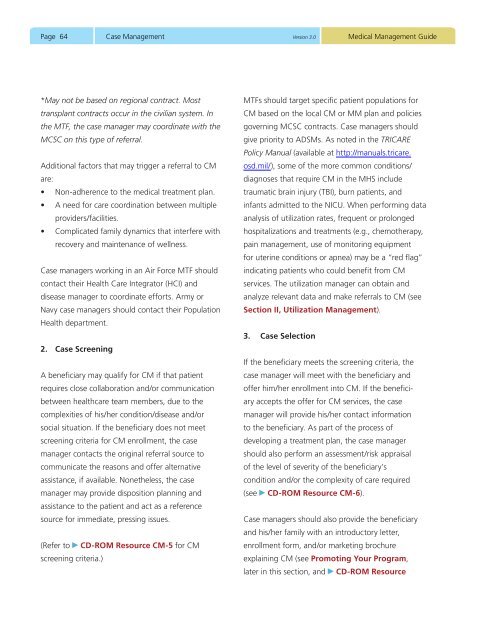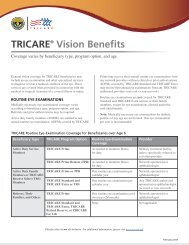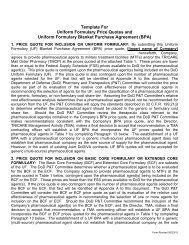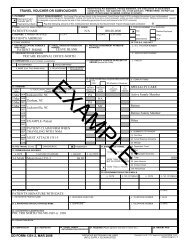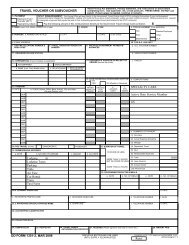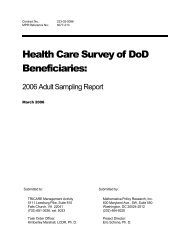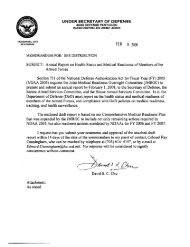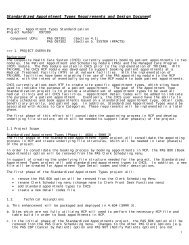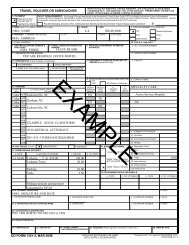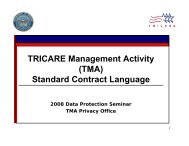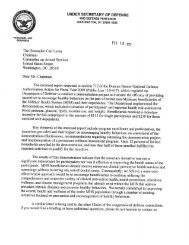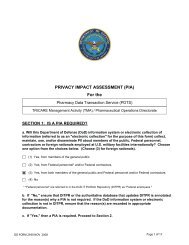Medical Management Guide, 2009, Version 3.0 - Tricare
Medical Management Guide, 2009, Version 3.0 - Tricare
Medical Management Guide, 2009, Version 3.0 - Tricare
- No tags were found...
Create successful ePaper yourself
Turn your PDF publications into a flip-book with our unique Google optimized e-Paper software.
Page 64Case <strong>Management</strong> <strong>Version</strong> <strong>3.0</strong><strong>Medical</strong> <strong>Management</strong> <strong>Guide</strong>*May not be based on regional contract. Mosttransplant contracts occur in the civilian system. Inthe MTF, the case manager may coordinate with theMCSC on this type of referral.Additional factors that may trigger a referral to CMare:• Non-adherence to the medical treatment plan.• A need for care coordination between multipleproviders/facilities.• Complicated family dynamics that interfere withrecovery and maintenance of wellness.Case managers working in an Air Force MTF shouldcontact their Health Care Integrator (HCI) anddisease manager to coordinate efforts. Army orNavy case managers should contact their PopulationHealth department.2. Case ScreeningA beneficiary may qualify for CM if that patientrequires close collaboration and/or communicationbetween healthcare team members, due to thecomplexities of his/her condition/disease and/orsocial situation. If the beneficiary does not meetscreening criteria for CM enrollment, the casemanager contacts the original referral source tocommunicate the reasons and offer alternativeassistance, if available. Nonetheless, the casemanager may provide disposition planning andassistance to the patient and act as a referencesource for immediate, pressing issues.(Refer to CD-ROM Resource CM-5 for CMscreening criteria.)MTFs should target specific patient populations forCM based on the local CM or MM plan and policiesgoverning MCSC contracts. Case managers shouldgive priority to ADSMs. As noted in the TRICAREPolicy Manual (available at http://manuals.tricare.osd.mil/), some of the more common conditions/diagnoses that require CM in the MHS includetraumatic brain injury (TBI), burn patients, andinfants admitted to the NICU. When performing dataanalysis of utilization rates, frequent or prolongedhospitalizations and treatments (e.g., chemotherapy,pain management, use of monitoring equipmentfor uterine conditions or apnea) may be a “red flag”indicating patients who could benefit from CMservices. The utilization manager can obtain andanalyze relevant data and make referrals to CM (seeSection II, Utilization <strong>Management</strong>).3. Case SelectionIf the beneficiary meets the screening criteria, thecase manager will meet with the beneficiary andoffer him/her enrollment into CM. If the beneficiaryaccepts the offer for CM services, the casemanager will provide his/her contact informationto the beneficiary. As part of the process ofdeveloping a treatment plan, the case managershould also perform an assessment/risk appraisalof the level of severity of the beneficiary’scondition and/or the complexity of care required(see CD-ROM Resource CM-6).Case managers should also provide the beneficiaryand his/her family with an introductory letter,enrollment form, and/or marketing brochureexplaining CM (see Promoting Your Program,later in this section, and CD-ROM Resource


